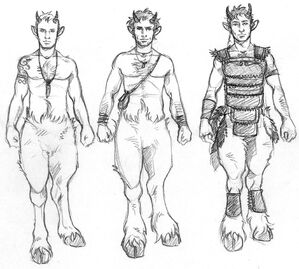
A pair of Satyr. Art by Magdalena Partyka. http://werdandi.deviantart.com/
Origins[]
The Satyr were bought into being by the joint efforts of Roëna and Vârsha late in the Third Age. The two goddesses created the Satyri to be creatures of passion and revelry; free spirits celebrating the bounty of life amidst the horrors and despair of the Third Age. The goddesses did their work well. Immediately following the creation of the Satyr, their revelry bought them to the ends of the earth, and many Satyri mated with Humans and other races to produce the beings now known as Satyr-kin or Fauns.
Appearance[]
The Satyr are physically similar to humans in build. They have goat-like legs and tails, as well as pointed ears and long curling horns that jut from their forehead. Satyr are nimble and quick-witted, and able to slip free of all but the most insidious of enchantments. For reasons that remain unknown, a Satyr has never been born with the gift of Psionics, and they seem totally incapable of learning how to use this strange power.
Culture[]
Satyr refer to themselves as Satyri, and they are well known across the face of Sidereus for their indomitable spirits and love of revelry and passion, dance and song. They are very easily led to vice since they embrace the more fickle and unpredictable things in life, however they are generally honorable and the vast majority of them will not hesitate to stand for what is right. When a Satyr is led to the path of Shadow, they tend to be capricious, violent, impatient and raucous. Enough Satyr have been twisted to the side of evil over the years that there are whole tribes of Satyr who have devoted themselves to dark gods such as Perdita, Melantha, and occasionally Xi’rian.
All Satyr believe very deeply in personal freedom and independence, and most enjoy nothing more than a good celebration and a glass full of wine or mead. Satyr come from a highly polygamous society, and while they do practice marriage, they often have many spouses of both genders. While some races view this behavior as reprehensible, Satyr view their polygamous lifestyle as a celebration of love; feeling that every creature is free to do as she wishes, but no creature should ever be shackled by love – which is ultimately intended to free the soul. Satyr are also notoriously bisexual and there are not many of them who express sexual interest in only one gender. Satyr males are less commonly bisexual, but this viewpoint is believed to be learned from centuries spent in close proximity to the other races. Satyr do not distinguish between the genders as anything more than a technicality, and they do not place any restrictions on what an individual can or cannot do based on gender.
Satyr are rarely warriors by trade, though they will rise up and fight as a community if the time calls for it. What Satyr lack in ferocity, they make up for in cunning. Satyr warfare involves methods of deception and hit-and-run tactics, trying to confuse and mislead the enemy rather than become mired down in any direct confrontation. Satyr prefer spears and ranged weapons when they engage their enemies, since they believe getting to close to a foe is merely tempting death.
Satyr are almost always welcomed into any society across the face of Sidereus. Though they are turned away from the odd human settlement on occasion due to various prejudices, this does not stop their revels and they continue to be prolific and spread throughout the world. Satyr will spend every night in celebration (and every day if able), and they believe that a good party is the best remedy for the soul. Upon the death of a fellow Satyr, the entire community will join together in a massive festival, gathering Satyr from all the nearby communities. Rather than mourning the loss of their kin, they choose to celebrate the fact that the individual ever lived.
Deeds are very important to Satyr, and they will often take a middle name upon reaching adulthood that names a deed they hope to achieve. While they are young, they will carry the surname of a parent or favored ancestor who came before them, and upon achieving the deed they chose when they first reached maturity, they will change this surname and take their own. The concept of kinship is very important to Satyr, but they do not draw such distinctions directly. All Satyr are siblings to one another, this having a great deal to do with the likelihood that none of them are actually sure who is related to whom. Even the most evil of Satyr will shudder to betray another Satyr, as these bonds of kinship between the species are just as tight as any Human bonds of family, if not more so.
Satyr's Curse[]
While Satyr do not take insult quickly, rumors have been told of the power of a Satyr’s curse. Some Satyr seem to have the ability to curse other creatures, causing them to suffer severe misfortune, even resulting in minor injury. While the source of this strange power is unknown, it is believed that it is a result of the blessing bestowed upon the satyr by Vârsha at the time of their creation.
Playing a Satyr[]
Playing a Satyr in Sidereus is a complicated task. When playing a Satyr, you must always remember to remain as jovial and light-hearted as possible, keeping in mind the viewpoint that life is a great dance, and that all Satyr believe it is one best performed with vigor and excitement. Being a Satyr is about playing to emotional extremes and being confident and carefree.
Costuming[]
Satyr characters may not be for everyone. Playing a Satyr requires a relatively complex costume. Satyr have large, furry legs that bear a vague similarity to goats. They never wear pants, though they will wear a loincloth or armor from time to time depending on their personal wishes. Because of genetic shifts over the centuries, not all Satyr have hooves. They do all have short goat-like tails, horns, pointed ears, and furry legs. These traits must be represented in order to play a Satyr.

